![]()
The Words of the Schukers Family
|
|
The Words of the Schukers Family |
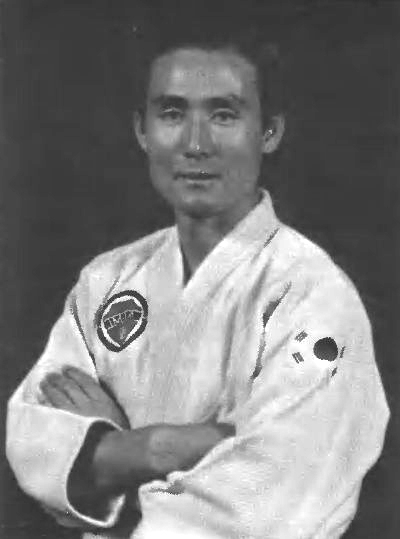
Dr.
Joon Ho Seuk, founder and grandmaster of Wonhwa-do.
When Dr. Joon Ho Seuk shared his worldwide vision for Wonhwa-do in 1979 with his first students, no one believed him. He told them that soon there would be demonstration teams of black belts traveling all over the world promoting the spirit of Wonhwa ("harmony") and the ideals of Unificationism. He shared with them how Wonhwa-do would spread, and that instructors would be sent out to start schools in Europe, Asia, Africa, and South America.
It would have been hard to believe him then, for at that time there was just a handful of students studying this newly created martial art in Belvedere and Barrytown. There was only one black belt, Dr. Seuk, and everyone else had white (beginner) belts. How would it be possible to accomplish all that he planned?
It is important to note that the power, inspiration, and continuing support for Wonhwa-do comes from True Father. Dr. Seuk is above all else a student of Father's words and life. His earnest desire was to express the power of Unification Thought through a new martial art that would systematize and integrate the best aspects of existing styles into a unified system. In this way, all martial arts could be harmonized and could fulfill their original purpose.
Through the study of Wonhwa-do, sons and daughters of loyalty and filial piety can be nurtured. Students learn to persevere through any hardship or difficulty and determine to fight against injustice with an indomitable spirit. Father himself has always stressed the importance of studying Wonhwa-do to the seminarians at the Unification Theological Seminary. All East Garden security guards are encouraged to train so they will be equipped to protect the True Family.
Today, we see a phenomenal growth that has taken place since Dr. Seuk began speaking about Wonhwa-do eight years ago, and the plans that he now shares with his students include even more ambitious undertakings for the future.
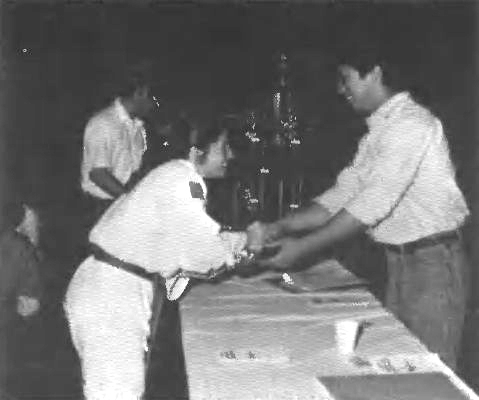
Honorary
Wonhwa-do president Hyo Jin Nim presents a trophy to Robin Baum at
the Second Annual Wonhwa-do Tournament.
Wonhwa-do first made national news with the Unificationism and Martial Arts Tour that was held on key campuses across the country just after Dr. Seuk came to CARP in 1983. He toured with a black-belt demonstration team and went to Boston University, U.C. Berkeley, University of Houston, University of Wisconsin at Madison, Ohio State University, University of Chapel Hill in North Carolina, and U.C.L.A.
The national campaign was a huge success and the attitude of students towards CARP on college campuses completely changed. On the foundation of his position as founder and grandmaster of Wonhwa-do, Dr. Seuk spoke strongly about "Godism" and the need for a new morality and spiritual awakening in the country. He testified to Father as the founder of this new philosophy that offers a comprehensive way to solve the world's problems.
Wonhwa-do is now being taught on campuses across the country. There are two commercial dojangs that are operating in Berkeley, California, and Houston, Texas. The impact that a commercial dojang can have on the community is tremendous. Michael Kellett operates the Berkeley, California, dojang and has enrolled professors, teachers, lawyers, and medical doctors in his classes. He also draws high-quality students from the U.C. Berkeley campus, and as a result of his activity he was recently asked to teach physical education in an elementary school in the area.
Wonhwa-do is also being taught as a part of home church outreach activities in the United States. Wherever a black belt goes, he or she can have an automatic inroad to the community, since parents are always looking for activities for their children that will not only challenge them physically but will enable them to grow in character and spirit. Thus we find that at churches, YMCAs, and community centers around the country, parents and their children are studying Wonhwa-do and through this are being inspired by Unification Thought.
Two major tournaments are held annually in the United States: the East Coast Inter-Collegiate Tournament and the National Wonhwa-do Tournament. The second annual National Tournament, held in 1985, was especially historic because Hyo Jin Moon, himself an accomplished martial artist, was made honorary president of the International Wonhwa-do Association. Hyo Jin Nim also presided over the first International Wonhwa-do Tournament that was held in New York during the Han Ma Dang Games of the Third CARP Convention of World Students in 1986.
Hyo Jin Nim shared deeply about his hope for those students studying Wonhwa-do. He said: "I sincerely hope that you have a bigger sense of responsibility now, because you have that kind of strength, determination, endurance, and patience which you have learned through Wonhwa-do. That means you have to give more to people who are weak and people who are struggling. It means you have to embrace them with your strength and lay that kind of foundation for others to follow. That is a heavenly warrior and a heavenly soldier:'
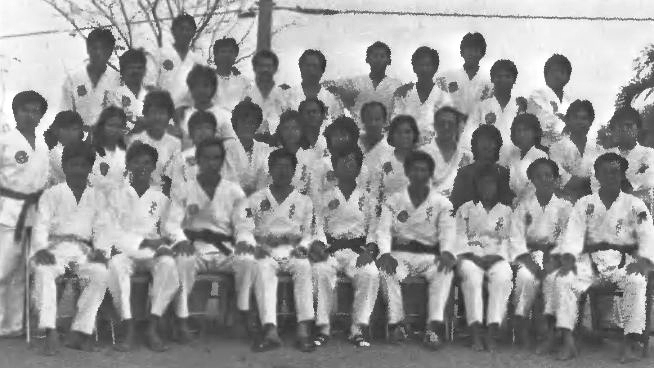
Participants
of a seven-day Wonhwa-do seminar in the Philippines. Gerry Servito is
seated center front.
In 1984, Gerry Servito (UTS '82) went to the Philippines as the first international Wonhwa-do pioneer and CARP national leader. His hope was to be able to use Wonhwa-do as one important vehicle to strengthen the spirit of Filipino youth and to contribute to the betterment of the Philippine nation and its neighbors.
He found ready supporters for such a vision in the faculty of the universities, and with their assistance there are now over 500 Wonhwa-do students in the Philippines. One university professor recently proclaimed Wonhwa-do to be the "best" martial art in the Philippines, and two universities have made it a required course for their students. The government has also expressed interest in Wonhwa-do since there is a deep concern in the country to promote values among young people.
At this time there are 26 instructors who teach in 14 cities. A quarterly called "The Martial Heart:' which focuses on value-oriented education in the martial arts, is beginning publication.
Wonhwa-do has also become an invaluable educational tool for raising up leaders and members in our movement in the Philippines. Through studying Wonhwa-do, they can clearly understand the concept of vertical relationships in theory and in practice.
The "Chung Hyo" spirit of loyalty and filial piety is strongly stressed, and it has helped members develop proper Cain/Abel relationships. Members are now caring for each other more deeply as true brothers and sisters, and so, through the internal strength of Wonhwa-do, our movement in the Philippines is developing very quickly.
Dr. Seuk sent black belt Steven Kearney (UTS '84) to the Philippines in 1986 to assist Gerry Servito in the training of black belts. By that time there were so many students in the Philippines who wanted to study Wonhwa-do that there were not enough instructors to go around. Intensive trainings were conducted, and by early 1987 enough new black belts had been trained to allow Dr. Seuk to send Steve to Thailand, which had for a long time requested an instructor.
Thailand has a very strong Buddhist tradition, so trying to introduce the concept of God has been very difficult for our church members. The early reports that are now coming back are that through Wonhwa-do many young people are able to make a connection to the principles and traditions of our movement. Advanced trainings for members have already been held, and soon a new generation of black belts will be ready to serve in other countries in Asia and Africa.
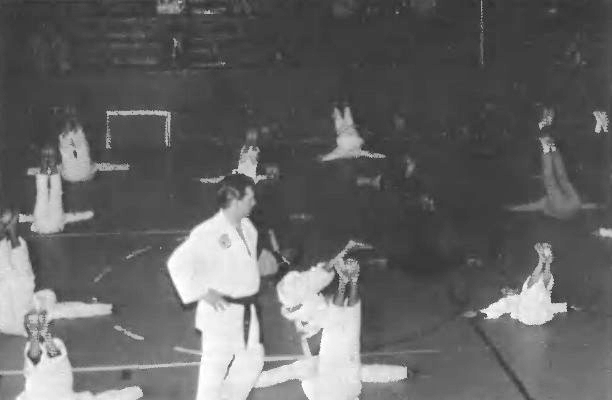
John
Umlauf teaching children in his home church area in New York City.
German campuses have traditionally been very difficult places for CARP members to work. The main reason is that there are no established clubs or organizations on campuses as there are in the United States. But when Tadao Kawahara brought Wonhwa-do to Germany in 1985, an opportunity presented itself. Even though the universities allow no campus organizations, all large cities have sports clubs that attract many young people. The answer was to create a Wonhwa-do Martial Arts sports club! The results have been truly inspiring.
Now many university students are connected to CARP and our movement through the bridge that Wonhwa-do has created. At the recent German Wonhwa-do Tournament, over 70 people took part. More than half of the participants and all the top winners were non-members!
Germany has also been the site of several special training sessions for European members, conducted by international instructor Kensaku Takahashi. Students who were trained at these sessions are now teaching in England, Ireland, Italy, and other European countries.
Dr. Seuk is always receiving requests from the foreign missionaries to send black belts to teach in their countries. He usually has many more requests than there are black belts to send.
This year a black belt from the Philippines will be going to Africa to begin teaching Wonhwa-do in Kenya. In addition, other students who were trained in the Philippines and in Thailand are now teaching in Mauritius, Malaysia, and Hong Kong.
In 1986 Getulio Santos returned to his native country of Brazil and began teaching at the Brazilian Unification Theological Seminary. He built a dojang at the school and is teaching the seminary students. Kensaku Takahashi conducted a special training in Brazil in June to develop Wonhwa-do in that country.
At the last promotion test at Belvedere, Dr. Seuk spoke about how Wonhwa-do will soon be taught in Eastern European countries. Teams of black belts will travel around these communist countries and revive the spirit of the young people. And after that? We will have a Unificationism and Martial Arts Demonstration at Red Square in Moscow -- where else!
In our Wonhwa-do seminars in the Philippines, there are two key aspects to Wonhwa-do education:
Sung Sang Aspect -- Morning Service: This is based on Rev. Yo Han Lee's book Faith and Life. This provides guidance on the defense and maintenance of a personal spiritual life. This is how we establish Wonhwa ("harmony") with our leaders and members, within the Principle of Restoration. Principle of Harmony Lectures: There are seven of these, given each day during the morning lecture period. They are based upon Unification Thought views of God, Creation, Original Human Nature, Ethics, Education, Art, and History.
Hyung Sang Aspect -- Self-defense Training: This involves all the basics, forms, one-step sparring, free-sparring, and other techniques of Wonhwa-do physical training.
By devoting attention to both these aspects of Wonhwa-do, we are finding it possible to broaden the students' concept of the Do, or "way:' Thus, they realize that as they progress in belt ranking, they must also improve their ability to achieve Wonhwa ("harmony") with the heart of God, their Abels, their peers, and their followers. Thus, the scope of the "Way of Harmony" is something more than mere physical self-defense; it is broadened into a more traditional understanding of the "Do" as a pathway for personal development.
As a result of these experiences, I am finally coming to understand True Father's reason for encouraging the study of martial arts. I can understand the heart of my grandmaster Dr. Seuk more, and I can appreciate the true mission of the Wonhwa-do Association -- that is, to help our family members achieve the fighting spirit they need to "charge bravely forward"
Our daily life is really a "war" at least spiritually, and True Father is clearly a "warrior" In order to fulfill the Children's ['ledge, we have to inherit that indomitable spirit against evil ourselves. This concept is very helpful since Rev. Kwak has encouraged us to be a patriotic movement to save the nation of the Philippines. Here, we are confronted with a substantial enemy -- rural and urban communism. IN When we remember our "enemy" we are able to keep our focus. But when we lose sight of this adversary, we tend to lose fighting power and get trapped in less important inter-personal problems.
So when it feels too hot to practice, we recall the Philippine military who train in full battle gear, and we recall the misled patriots who have fled into the mountains to train with the "NPA" (the communist "New Peoples' Army"). Then we can revive our determination to offer this unique indemnity condition. And in any case, we are able to defend ourselves physically against the assault of leftist students.
Indemnity is inescapable. Here in the Philippines, we have a choice to pay now and avert a communist takeover, or pay later on, after the communists have taken power. And so we push ourselves forward with the spirit of Wonhwa-do, which is, in the final analysis, a manifestation of our Father's heart and will. We hope that as we succeed in establishing Wonhwa in ourselves and in our movement, we will create the foundation for God to protect and preserve this nation and its role in Southeast Asia.
There is a final point I must mention, and that is a realization I have had about the goal of Wonhwa-do. It may seem obvious, but is has taken me years of following the "Do" to catch it, and it bears sharing.
In Wonhwa-do, three words are constantly spoken: Chun ("loyalty"), Hyo ("filial piety"), and Wonhwa ("harmony"). We say them so often in practice that we might eventually overlook the reason we say them, especially since it is the techniques we practice that draw most of our effort and attention. But now I feel the essence of Wonhwa-do is contained in these three simple words.
I believe the goal of Wonhwa-do training is to cultivate the kind of personality and heart summed up in the holy song "Tan Shim Ga" -- that is, a heart loyal unto death, and beyond it. This is achieving the ultimate harmony -- harmony of one's heart with the heart of God and His leaders. That song apparently originated in ancient Korea, when a certain general was to go into a deadly engagement on behalf of his king. Everyone knew his chances of survival were bleak, yet the general never wavered in his loyalty, and he sang this song for his king before departing on his mission. I think this is what God wants to teach us through Wonhwa-do. As the holy song "Pledge" goes: "Nothing can change a loyal heart."
When I received my new mission to serve in the Philippines, I asked my grandmaster what my attitude to my new Abels should be. I needed to know, since I didn't want to ever forfeit the special teacher/student relationship I had with him. Dr. Seuk told me to just be a loyal man whatever I did, whomever I would work under.
Looking back on those words more than two years later, I can understand what Father's hope for the Wonhwa-do mission really is: It is to produce the kind of loyal and filial sons and daughters who can take on the cares of the parents as their own and never be blinded to deviate from such oneness under any circumstances. That is what Wonhwa-do instruction must most deeply aim at. The techniques are the Hyung Sang medium of instruction towards something much deeper and fulfilling, which is, in fact, the substantial realization of the love between parents and children. Thus, the darkness of one's belt should ideally be an indication of the depth of one's virtue. As one student said, "I like to see my belt as a measure of how much I have been loyal and filial; how much I have cared and loved."
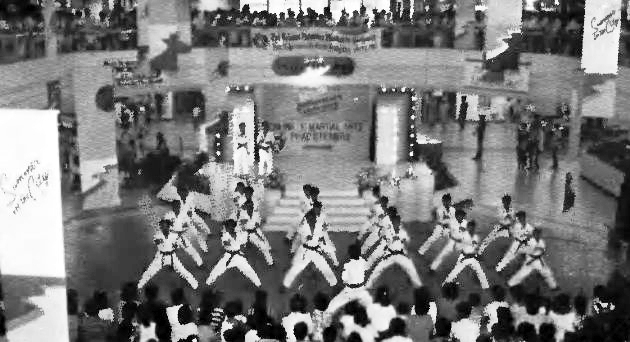
Public
demonstration at a shopping mall in Manila, the Philippines.
Wonhwa-do has done many things for my life: It has made me more aware of myself, and it has made me closer to God's and True Parents' heart. I have been able to open my own heart to the virtues of loyalty, filial piety, and parenthood and to strengthen my will and redirect my hopes and desires toward goodness.
In short, Wonhwa-do has brought me back to life. In fact, it is my life, and it always will be. I feel revived and refreshed, like a newly-recharged battery! It seems the blood of Wonhwa-do is flowing within my veins. The main reason I am indebted to Wonhwa-do is that through it, I was able to substantialize the Principle. Primarily, I came to value my Abets.
Before, I could not really love my Abets or appreciate their meaning to my life. I couldn't humble myself to them, especially when I saw their fallen natures. However, when I stand before my Wonhwa-do teachers, I feel a deep humility. Somehow
I can obey them. This is because Wonhwa-do emphasizes loyalty and filial piety so much. I can follow my teachers because they are the ones who are leading me to become the realization of God's ideal. One thing for sure: Wonhwa-do made me a better individual with a greater sense of responsibility-for those above me and those beneath me. It is my desire to walk through this course successfully. Everyone wants to be great. Wonhwa-do helps me strive to achieve excellence. It is not only the act of doing something with excellence that has been valuable; it is the attitude of humility I receive after having done my best. But even more than this, I love Wonhwa-do because it makes me feel needed. If I can truly achieve the purpose and objectives of Wonhwa-do, then people will need me. If I can fulfill people's desires, I can give joy to them. What more joyful and noble thing can I do than to give joy to God and my brothers and sisters?
I hope to inherit not only the desires of my teachers, nor their ideals alone, but more importantly, the heart of my teachers. I want to bring life to other people with this new understanding and to be a person God can trust and rely on. I want to become God's "sidekick" and True Parents' "sidekick"! As Father has said, "If you can't be the moon, then at least you can be a lighthouse that serves as a guiding beacon of light to guide the ships during the night"
Wonhwa-do is truly deep and personal for me. Ever since I walked this path, life has been difficult, but there's always meaning in it, and this makes it so very valuable and precious.
Wonhwa-do is a new concept in martial arts. It is an art of unarmed combat for self-defense centering on Unification Thought (the Principle of Harmony) and has as its goal the unification of all martial arts.
Wonhwa-do literally means the "art of harmony" or the "way of harmony!' It is not merely physical training in defensive techniques but, more importantly, a way to build character and promote spiritual growth.
In Wonhwa-do, the best techniques of "hard" and "soft" martial arts are unified and integrated with the concept of the Principle of Harmony. Existing techniques have been analyzed and improved, and new techniques have been devised to form a comprehensive self-defense system.
Each of the forms, or "hyungs," of Wonhwa-do are created around one of the themes from Unification Thought. For example, the first form is Sawi Gidae Eui Hyung or Form of the Four Position Foundation. Another form is called Samdange Eui Hyung or Form of the Three Stages. Each "hyung" has a diagram around which the movements of the hyung are performed. Chang Jo Eui Hyung Form of Creation, has this diagram:
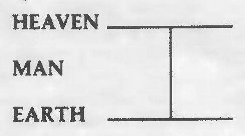
The diagram symbolizes heaven, man, and earth. In this scheme of creation, the Principle of Harmony is the absolute center, while man is its relative center; he is the intermediary through which heaven and earth are connected.
However, for man to merit this position of cosmic authority, he must first strive for personal perfection. Thus the student first shouts, "Jah Ah Joo Gwan" which means "Dominion over Self" and then "Chun Joo Joo Gwan" or "Dominion over the Universe." This means that before one can have dominion over the universe, one must first have dominion over oneself.